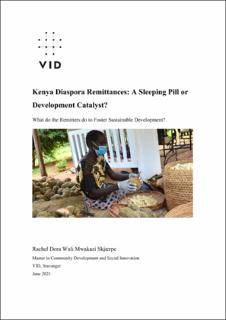| dc.description.abstract | This thesis is concerned with the concepts of community development and in particular the perception of diaspora to development in their home country through their remittances. The research focuses specifically on Kenyan diaspora and their motivation and perception to remit money and other resources, and what the remitters do to foster sustainable development. The informants in this research are all drawn from Kenyans working in abroad who support their families, friends or communities and their home country through remittances of money, skills, and knowledge transfer.
This study also seeks to understand the presupposition on sustainable development values remittances have on people’s lives and communities, as well as the constraints and challenges facing diaspora engagements in their home country.
In the study, remittances are analysed through the perspective of the remitter on whether they can be leveraged for fostering sustainable community development or function like foreign aid.
Foreign aid has been long criticized for fostering dependency and laxity; making the recipients less innovative in finding solutions to address their challenges. The study takes into consideration whether diaspora has had a mindset shift by shifting from fostering ‘dead aid’ (Moyo, 2010) and embracing ventures that are empowering and sustainable.
The two groups of informants in this study both display the interest for engaging with organisations that deal with Kenyans in abroad which are offering investment opportunities that resonate with their remitting motivations.
The results suggest that diaspora Kenyans recognise the potential impact their remittances have on their communities and country’s development. However, the absence of organised structures in the Kenya, trust and transparency limits them to sending remittances for consumption more than towards investments. This highlights the importance of engaging diaspora in dialogue initiated from their home country. It would also contribute towards mainstreaming policies that facilitate the flow of remittances, skills and knowledge transfer towards socio economic development of Kenya. | en_US |
